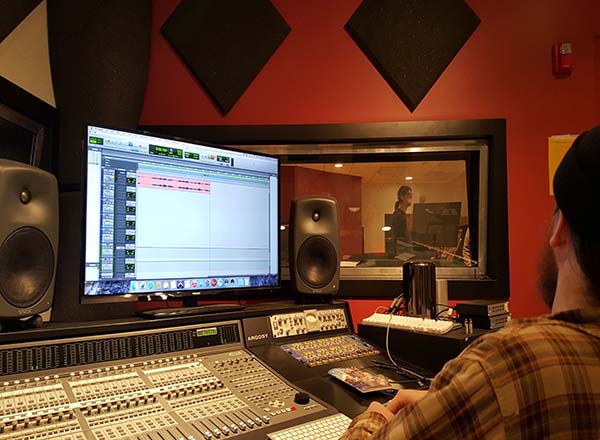One-year Recording Arts program converted to online format

HFC’s one-year Certificate of Achievement in Recording Arts (CARA) (formerly called the Recording Arts Certificate Program or RACP) will be taught online for the 2020-21 academic year.
Recording Arts students will need to come to the HFC campus six times during the Fall 2020 Semester and 6-9 times during the Winter 2021 semester.
"The Recording Arts staff will work with any student who may not be able to come to campus,” said HFC CARA manager Jeremy Palmer. “We are offering the Recording Arts program online, along with the entire music curriculum, to provide students with a safe, viable alternative to continuing their education uninterrupted during the pandemic.”
CARA instructors are Pro Tools certified
This is just one of many upgrades for the fall. As previously announced, HFC is now an academic partner in the AVID Learning Partner Program and has implemented Pro Tools software in the Recording Arts curriculum. All CARA instructors have achieved Pro Tools certification.
“The entire certification can be earned by taking online/remote instruction from us. There are at least five students from the most recent classes who are now Avid Certified Pro Tools Users,” said Palmer.
HFC only educational institution offering Pro Tools in tri-county area
HFC is the only educational institution in southeast Michigan to offer Pro Tools software, which is considered the industry gold standard for music/recording software. Pro Tools is a digital audio workstation (DAW) that is used for music creation, production, voiceover work, sound recording, sound editing, and sound mastering processes, as well as post-production on movies and television shows.
Obtaining Avid Certified Pro Tools User certification requires passing two different exams of increasing difficulty that test knowledge and skills of the software Pro Tools.
“This program will teach students all the basic skills needed to work in the industry, and will provide them an opportunity to become Avid Pro Tools Certified,” said Palmer. “As one of our Advisory Board Members, Eric Morgeson said, ('Avid Pro Tools Certification) will give you a chance to sit in the chair’ [as the engineer of a recording session].”
5 primary classes in CARA program
There are five primary Recording Arts classes, totaling 14 credit hours, that a student will take:
- Recording Studio Engineering 1
- Audio Mastering 1
- Recording Studio Engineering 2
- Audio Mastering 2
- Advanced Studies in Recording Techniques (a capstone course)
In these classes, students will learn all the necessary skills to set up, record, mix, and master audio projects. This includes more than an understanding of how to use the Pro Tools software, but also microphone placement, analog-to-digital conversion, and the use of common digital audio workstation tools (such as plugins) to achieve well-balanced mixes.
Students are also required to take basic music courses, including Music Fundamentals, Theory, Class Piano, and other music classes. This makes CARA unique among similar programs, as students will not only understand the engineering side of music and audio, but will also understand the music itself.
Students benefit from knowledge of instructors who are either sound or recording engineers
This program can be done in one academic year for students who are able to go full-time and immerse themselves into the world of recording arts. For part-time students, two years is a likely timeline. CARA is designed to begin in the fall semester.
“I have seen many students come into the program knowing nothing about recording or engineering, and after immersing themselves in the program, they have become knowledgeable and skilled in both recording arts and music. If a student wants to succeed in this industry, they can gain the necessary skills to begin their journey here,” said Palmer. “Our teachers are all professionals in this industry, working as sound and recording engineers, many owning their own studios. Those are some of the intangibles you can't learn from a book that make it worth taking classes at HFC.”
For questions or more information about the CARA, contact Palmer at jspalmer1@hfcc.edu.